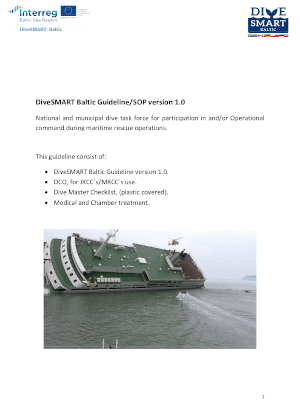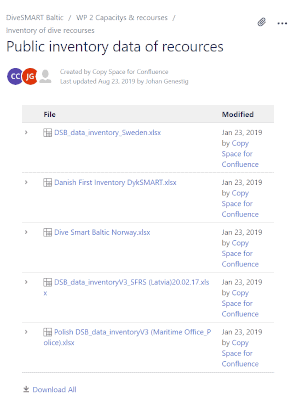DiveSMART-Baltic
Gaps in emergency preparedness
The accident of Costa Concordia in Italy from 2012 was an alarming lesson for the rescue services in Sweden, Finland and Poland. Considering the dense shipping traffic in the Baltic Sea with about 2,000 operating in the Baltic Sea at any given minute throughout the year, colliding windfarms and other underwater architecture, accidents in the Baltic Sea can take place, too. However, there is neither an overview of divers’ competences available, nor common procedures in place for countries around the Baltic Sea to support search and rescue missions in underwater environment. A lack of coordination on the national and international levels inevitably leads to gaps in the emergency preparedness, meaning a longer response time and fewer lives saved as the consequence.
Budgets
in numbers
-
2.25MillionTotal
-
1.72MillionErdf
-
0.00MillionEni + Russia
-
0.00MillionNorway
Achievements
Divers competences mapped
The first in the Baltic Sea region online database created by DiveSMART-Baltic compiles human diving resources and competences as well as diving equipment in Denmark, Estonia, Finland, Germany, Latvia, Lithuania, Norway, Poland and Sweden. Thanks to this database currently managed by the Swedish Coast Guard, rescue services and authorities in countries around the Baltic Sea can validate the available resources, and better plan search and rescue missions in an underwater environment where local resources are not sufficient.
Common operational procedures put into test
In six table top and two live exercises, DiveSMART-Baltic brought together diving communities from Denmark, Estonia, Finland, Germany, Latvia, Lithuania, Norway, Poland and Sweden, offering them a unique opportunity to train search and rescue missions. During Europe’s biggest diving exercise in Kotka, Finland (November 2018), 65 divers from six countries spent 36 hours in water to save lives of 45 people.
This exercise enabled to test the newly developed Standard Operational Procedures all the way from alarming, mobilisation to life-rescuing diving. They clarify and harmonise how Rescue Coordination Centres, rescue services, coast guards, fire departments, police and armed forces around the Baltic Sea should cooperate in case of an accident to reduce the reaction time to accidents. Guidelines for dive coordinator officers are already in use by the Maritime Rescue Coordination Centre in Helsinki, Finland and the Joint Rescue Coordination Centre RCC in Tallinn, Estonia.
The procedures also serve as a baseline for a long-term exercise plan developed by the project, which include the exercises in May 2019 in Stockholm, Sweden, and in September 2020 in Gdynia, Poland.
Maritime safety improved
The Interreg project DiveSMART-Baltic used EUR 1.72 million from the European Union to make the best out of limited diving resources in countries around the Baltic Sea. By bringing diving communities closer together, the Interreg project DiveSMART-Baltic improved the overall maritime safety in the Baltic Sea.
The project results are now in use in the project platform ResQU2, which further develops the expertise of national authorities and rescue services in countries around the Baltic Sea to cope with accidents in the Baltic Sea and in ports, including those involving hazardous substances.
Outputs
Standard Operational Procedure (SOP)

The inventory of human resources and diving equipment

Project Stories
-
10.06.2021
Better prepared for emergencies thanks to Interreg
With an average of 300 accidents per year, as reported by the Baltic Marine Environment Protection Commission’s (HELCOM), the Baltic Sea seems to be a challenging area for navigation. The ResQU2 platform has reinforced the preparedness of rescue authorities, services, seaports and other authorities for large-scale incidents in the Baltic Sea.Read full story
Partners
Swedish Coast Guard
- TownKarlskrona
- RegionBlekinge län
- CountrySweden
- RepresentativeElse Timms
- Phone
- E-Mail
- Web
Swedish Armed Forces
- TownKarlskrona
- RegionBlekinge län
- CountrySweden
- RepresentativeJerry Lindén
- Phone
- E-Mail
- Web
Yrgo, Education Department, City of Gothenburg
- TownGöteborg
- RegionVästra Götalands län
- CountrySweden
- RepresentativeSvante Boström
- Phone
- E-Mail
- Web
Cold Cut Systems
- TownKungsbacka
- RegionHallands län
- CountrySweden
- RepresentativeAnders Trewe
- Phone
- E-Mail
- Web
Finnish Border Guard
- TownHelsinki
- RegionHelsinki-Uusimaa
- CountryFinland
- RepresentativePekka Parkkali
- Phone
- E-Mail
- Web
URSUIT Ltd.
- TownTurku
- RegionVarsinais-Suomi
- CountryFinland
- RepresentativeMika Aitio
- Phone
- E-Mail
- Web
Polish Naval Academy
- TownGdynia
- RegionGdański
- CountryPoland
- RepresentativeTomasz Szubrycht
- Phone
- E-Mail
- Web
-
Project managerJonas WesterbergDykmagasinet
-
Legal representativeHelen FryklerSwedish Coast Guard
-
Financial managerHauke SiemenREM Consult
-
Communication managerJonas WesterbergDykmagasinet



